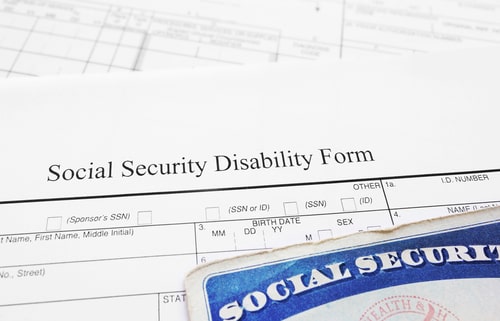Principal Office Located at 1424 Gables Court, Plano, TX 75075
Call Today For a Free Case Evaluation
Recent Blog Posts
What Information Is Needed in My Social Security Disability Application?
 Life is often difficult for those who suffer from disabilities. One of the many forms of assistance offered by the federal government is financial help through Social Security. The Social Security Administration (SSA) oversees two such programs: Supplemental Security Income (SSI) and Social Security Disability Insurance (SSDI).
Life is often difficult for those who suffer from disabilities. One of the many forms of assistance offered by the federal government is financial help through Social Security. The Social Security Administration (SSA) oversees two such programs: Supplemental Security Income (SSI) and Social Security Disability Insurance (SSDI).
The SSA gets tens of thousands of applications for each program every year, but not all applicants are approved. In many cases, the information provided in the application was either incorrect or insufficient to allow the claim to move forward. When you are applying for Social Security benefits, you need to have the required information prepared, organized, and included with your application.
Personal Data
The first set of required information is that which identifies you and provides details about your personal background. This includes your name, date of birth, place of birth, and Social Security number. You will also need to include your veteran status, if applicable. If you have a spouse and children, you must provide identifying information for them as well and include the date of your marriage or divorce if either of those applies to you.
Obtaining SSDI Benefits for Back Pain
 Do you suffer from back pain? Chances are, you do, since nearly everyone will experience some type of back pain in their lives. For many people, back pain is a chronic problem. According to experts, back pain leads to more than 264 million hours lost at work each year in the United States, making it one of the leading causes of missed work. In fact, back pain is the number one cause of disability in the world.
Do you suffer from back pain? Chances are, you do, since nearly everyone will experience some type of back pain in their lives. For many people, back pain is a chronic problem. According to experts, back pain leads to more than 264 million hours lost at work each year in the United States, making it one of the leading causes of missed work. In fact, back pain is the number one cause of disability in the world.
If back pain makes it unbearable for you to work, you might qualify for Social Security disability benefits. A qualified SSDI attorney can help you understand your available options for seeking the benefits you deserve.
Understanding “Medical Determinability”
Social Security disability benefits are not typically available on the basis of mild, intermittent, or moderate back pain. In order to qualify, your back pain must be associated with an impairment that the Social Security Administration (SSA) finds to be “medically determinable.” Essentially, the SSA will not approve disability benefits based on your reporting that you have back pain. Instead, you must show that some type of detectable problem, condition, or injury is causing your pain.
Heart Disease: Find Out If You Qualify for Social Security Disability Insurance
 Heart disease is no longer a “good ol’ boys club.” According to the Centers for Disease Control and Prevention (CDC), heart disease is the leading cause of death for women, responsible for one in four female deaths. Despite increased awareness, only 54 percent of women recognize heart disease as their number one enemy.
Heart disease is no longer a “good ol’ boys club.” According to the Centers for Disease Control and Prevention (CDC), heart disease is the leading cause of death for women, responsible for one in four female deaths. Despite increased awareness, only 54 percent of women recognize heart disease as their number one enemy.
More alarmingly, women often differ from their male counterparts in terms of heart-related symptoms. Men often present with the classic, clutching of the chest while almost 64 percent of women with heart disease are unaware that they even have a problem. Women often present without any type of heart-related symptoms at all. For many, feelings of dull chest discomfort, pain in the neck or lower jaw, or pain in the upper abdomen or back are often dismissed or self-diagnosed as stress or anxiety.
Benefits Might Be Available
Perhaps what else may not be evident, is that the Social Security Administration (SSA) recognizes heart disease under Section 4.00 Cardiovascular System - Adult, Disability Evaluation Blue Book as an approved medical disorder possibly eligible for Social Security Disability Insurance (SSDI) if all criteria have been met.
Crohn’s Disease and Social Security
 According to the Crohn's and Colitis Foundation of America, Crohn's disease, named after Dr. Burrill B. Crohn in collaboration with colleagues Dr. Leon Ginzburg and Dr. Gordon D. Oppenheimer, was first classified as Inflammatory Bowel Disease (IBD) in 1932. Crohn's was later removed from the IBD classification and received its own designation as a chronic inflammatory condition of the gastrointestinal tract. Crohn's commonly affects those between the ages of 16 to 40 years of age. Even more interesting, Crohn's primarily affects those living in northern climates and is not gender-specific.
According to the Crohn's and Colitis Foundation of America, Crohn's disease, named after Dr. Burrill B. Crohn in collaboration with colleagues Dr. Leon Ginzburg and Dr. Gordon D. Oppenheimer, was first classified as Inflammatory Bowel Disease (IBD) in 1932. Crohn's was later removed from the IBD classification and received its own designation as a chronic inflammatory condition of the gastrointestinal tract. Crohn's commonly affects those between the ages of 16 to 40 years of age. Even more interesting, Crohn's primarily affects those living in northern climates and is not gender-specific.
If you are living with Crohn’s disease, it can be difficult to maintain a “normal” lifestyle. With this in mind, you may be eligible for benefits under Social Security Disability Insurance (SSDI).
Common Indicators of Crohn’s disease
For the estimated 780,000 Americans who have been diagnosed with Crohn’s, the disease can be life-altering. Those living with this chronic condition usually find their lives disrupted by one or more of the following symptoms:
Preparing for an SSDI Appeal Hearing
 Applying for Social Security Disability Insurance (SSDI) benefits does not automatically guarantee automatic approval. If fact, more than 50 percent of all claims are initially denied, leading many people to wonder what their next steps are. If you have been denied SSDI benefits, you should contact a qualified Social Security attorney before you do anything else. Your attorney can help you manage the appeals process, including a potential hearing before an Administrative Law Judge (ALJ) with the Social Security Administration. As you prepare for your hearing, here are a few things to keep in mind.
Applying for Social Security Disability Insurance (SSDI) benefits does not automatically guarantee automatic approval. If fact, more than 50 percent of all claims are initially denied, leading many people to wonder what their next steps are. If you have been denied SSDI benefits, you should contact a qualified Social Security attorney before you do anything else. Your attorney can help you manage the appeals process, including a potential hearing before an Administrative Law Judge (ALJ) with the Social Security Administration. As you prepare for your hearing, here are a few things to keep in mind.
First Impression
Although you are not required to retain legal counsel, it is almost certainly in your best interest to have an attorney by your side. From a practical standpoint, plan on arriving early. First impressions absolutely matter, and by appearing polished and ready, you can show the ALJ that the case is important to you. In addition, your manner of dress should be conservative, so avoid suggestive or informal attire.
Applying for Social Security Disability With Early-Onset Alzheimer’s Disease
 Living with Alzheimer’s disease can be devastating—and not just for the affected patient. The person’s family and loved ones often have a great deal of difficulty adjusting to the person’s new reality as well. Also known as “younger-onset” Alzheimer’s, early-onset Alzheimer’s disease was added to the list of disabilities and diseases covered by Social Security Disability Insurance (SSDI) just a few years ago.
Living with Alzheimer’s disease can be devastating—and not just for the affected patient. The person’s family and loved ones often have a great deal of difficulty adjusting to the person’s new reality as well. Also known as “younger-onset” Alzheimer’s, early-onset Alzheimer’s disease was added to the list of disabilities and diseases covered by Social Security Disability Insurance (SSDI) just a few years ago.
Early-onset Alzheimer’s disease is considered under the Compassionate Allowance Initiative of the Social Security Administration, which gives the same access for early-onset patients to Social Security Disability Insurance (SSDI) and Supplemental Security Income (SSI) as traditional Alzheimer’s patients. The intent of the Compassionate Allowance Initiative is to allow patients with an extremely fast-moving degenerative disease (such as Alzheimer’s) to be fast-tracked through the approval process.
Could Chronic Headaches Qualify for Social Security Disability Benefits?
 Headaches are among the most common ailments people suffer, but for many with chronic headaches or migraines, it can be a debilitating condition. Many people with severe migraine problems have difficulty working or carrying on in the same capacity before the migraines increased to such severity. If this describes your situation, it might be possible for you to qualify for Social Security Disability Insurance (SSDI) benefits, and a qualified disability attorney can help you through the application process.
Headaches are among the most common ailments people suffer, but for many with chronic headaches or migraines, it can be a debilitating condition. Many people with severe migraine problems have difficulty working or carrying on in the same capacity before the migraines increased to such severity. If this describes your situation, it might be possible for you to qualify for Social Security Disability Insurance (SSDI) benefits, and a qualified disability attorney can help you through the application process.
What You Should Know About Chronic Headaches
Those who suffer from migraines know how painful and distressing they can be. Common symptoms of severe migraines include nausea, vomiting, loss of appetite, fatigue, dizziness, fever, blurred vision, and an intense sensitivity to light. All of these, of course, can impact a person’s ability to work.
A migraine, however, is just one of three types of severe headaches that a person can get. Others include tension headaches and cluster headaches. Cluster headaches are “described as having a burning or piercing quality that is throbbing or constant.” These usually last a short time, but many patients report that the cluster headache returns periodically throughout the day. A tension headache tends to increase and wane over prolonged periods of time and can affect a person’s ability to fall or stay asleep and result in general achiness and weariness.
Qualifying as a Dependent for Social Security in Texas
 Qualifying for Social Security benefits can be a long and complicated process, no matter what your specific situation may be. If you or a loved one is a dependent—either under 18 years old, under 22 years old and attending school, or require full-time care—the process is different than for independent adults. As a result, the application process is different and requires a different set of considerations.
Qualifying for Social Security benefits can be a long and complicated process, no matter what your specific situation may be. If you or a loved one is a dependent—either under 18 years old, under 22 years old and attending school, or require full-time care—the process is different than for independent adults. As a result, the application process is different and requires a different set of considerations.
Important Considerations for Minors Seeking SSI Benefits
For a child to qualify, according to the Social Security Administration, he or she must be either blind or disabled. The child can begin to receive Social Security Insurance (SSI) benefits as soon as he or she is born, and the child does not have to be of a certain age before he or she is able to begin receiving benefits. Once the child is 18, the SSA can reevaluate the circumstances to determine whether or not the child should continue to receive SSI benefits.
What to Do If Your SSDI Claim is Denied
 Applications for Social Security Disability Insurance (SSDI) have maintained an award rate of around 35 to 45 percent since 2001, according to the Social Security Administration (SSA). However, the rate of applicants who are awarded benefits at the reconsideration level is significantly less, which makes it important to understand reasons why a claim might be denied and what can be done to have the application reviewed again.
Applications for Social Security Disability Insurance (SSDI) have maintained an award rate of around 35 to 45 percent since 2001, according to the Social Security Administration (SSA). However, the rate of applicants who are awarded benefits at the reconsideration level is significantly less, which makes it important to understand reasons why a claim might be denied and what can be done to have the application reviewed again.
If your SSDI claim has been denied, you or your legal counsel will receive a certified letter from the SSA detailing the reason for denial. You do have a right to file suit within six months of the mailing date if you are not in agreement with the decision, but first, you or your attorney must file a request for reconsideration.
Qualifying for Disability Benefits
The SSA has a list of disabilities and impairments that fall under the scope of approval. An applicant may receive benefits if he or she:
Hypertension Could Qualify You for Social Security Disability Benefits
 High blood pressure, or hypertension, is one of the most common heart diseases in America. About one in three U.S. adults, roughly 70 million people, have high blood pressure, according to the U.S. Centers for Disease Control and Prevention. For some, the condition is manageable with lifestyle changes and prescription medications, but for others, hypertension can affect their entire lives. In situations like this, Social Security disability benefits may be available, and a qualified disability lawyer can help you determine your eligibility.
High blood pressure, or hypertension, is one of the most common heart diseases in America. About one in three U.S. adults, roughly 70 million people, have high blood pressure, according to the U.S. Centers for Disease Control and Prevention. For some, the condition is manageable with lifestyle changes and prescription medications, but for others, hypertension can affect their entire lives. In situations like this, Social Security disability benefits may be available, and a qualified disability lawyer can help you determine your eligibility.
Understanding High Blood Pressure
High blood pressure simply means that the pressure of blood in your blood vessels is more than it should be, causing your heart to work overtime. Risks of hypertension include heart disease and stroke, two of the most common causes of death for Americans. Hypertension is often referred to as a “silent killer,” because there are little to no warning signs of the disease. The only way to determine if you have high blood pressure is to have your blood pressure checked regularly.

 972-671-9922
972-671-9922





